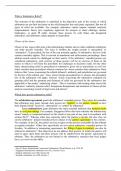What is Substantive Relief?
The outcome of the arbitration is embodied in the dispositive part of the award, in which
arbitrators set out their decisions on the relief/remedies that each party requested. But not all
types of relief are available. For example, arbitrators cannot impose criminal sanctions
(imprisonment, fines), give regulatory approvals for mergers or share offerings, declare
bankruptcy, or grant IP rights. Instead, these powers lie with States and designated
authorities, and arbitrators cannot purport to usurp them.
Choice of law issues
Choice of law issues often arise when determining whether and on what conditions arbitrators
can order specific remedies. The issue is whether the sought remedy is ‘procedural’ or
‘substantive’. If procedural, the law of the seat normally applies. If substantive, the law of the
contract normally applies. This is relevant in annulment and enforcement proceedings. Since
arbitral awards cannot be challenged on their merits, if the arbitrators’ remedial powers are
considered substantive, such exercise of those powers will be an exercise of them on the
merits in which it will limit the possibility for challenges to decisions made. On the other
hand, characterising relief as procedural or substantive gives rise to uncertainty as civil law
states consider them procedural whereas common law states consider them substantive. Born
believes that ‘issues concerning the arbitral tribunal’s authority and jurisdiction are governed
by the law of the arbitral seat.’ Also, where foreign procedural law is chosen, the procedural
law of the arbitration will apply, whereas ‘issues concerning the substantive standards for
granting relief and the quantum and character of relief are governed by the substantive law
applicable to the parties’ underlying claims’. This is consistent with treating other issues like
arbitrators’ authority (interim relief, Kompetenz-Kompetenz) and treatment of choice-of-law
analysis concerning awards of legal costs and interest1.
Which laws govern substantive relief?
The arbitration agreement grants the arbitrators’ remedial powers. They rarely list remedies
that arbitrators may grant. Instead, their powers are ‘implicit’ in the parties’ consent to have
their dispute finally ‘resolved’, ‘determined’ or ‘settled’ by arbitration.
Some national laws grant arbitrators the same remedial authority that national courts
have in civil proceedings. For example, Singapore follow this basis whereby the tribunal may
award ‘simply or compound interest on the whole or any part of any sum in accordance with
section 20(1)’2. Whereas other laws expressly allow the parties to decide, but also, they set
out the arbitrators’ default remedial powers subject to the parties’ agreement to the contrary.
For example, in the UK, the parties are free to agree on the powers exercisable by the tribunal
as regards remedies3. Other laws specifically set out certain arbitrators’ remedial powers. In
Sweden, ‘In addition to interpreting agreements, the filling of gaps in contracts can also be
referred to arbitrators’4. But other laws do not address their powers, in which the parties will
need to agree upon them and these powers will be implied from the parties’ agreement to
arbitrate. Thus, the arbitrators are not limited to the substantive remedies that local judges
have, yet views on this differ.
1
Gary B. Born, International Commercial Arbitration (Third Edition), at p. 3338-89
2
Singapore International Arbitration Act 2012, Section 12(5).
3
English Arbitration Act 1996, Section 48.
4
Swedish Arbitration Act 1999, Section 1.




